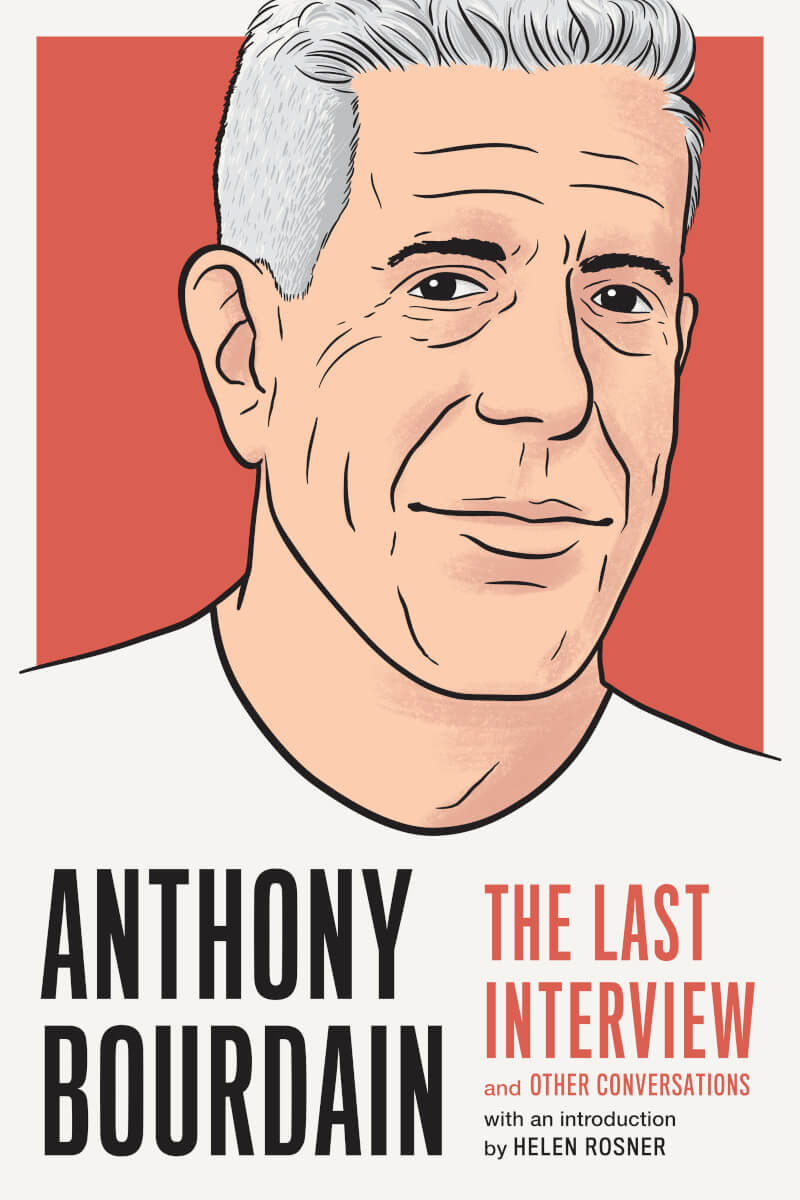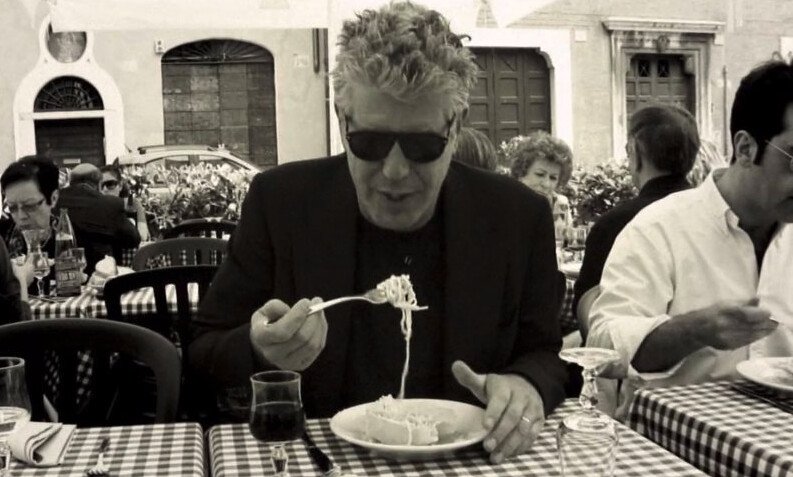Madhumita Murgia - 'Code Dependent: Living in the Shadow of AI'
So-called artificial intelligence as it affects real human beings.

I’ve read a lot on Anthony Bourdain. When I was younger and in my party days, I appreciated a fairly young chef who was all rock ‘n’ roll, swagger, and a recovered alcoholic (or so I thought), unlike the TV chefs of yore who were mainly over-appreciated drunks.
With time, Bourdain was still over-appreciated, although not by himself. He’d always cut himself down for the media, people who thought he was God because of his magnetism, literary swerve, and leathery decay.
In fact, Bourdain struggled with having become his own worst daymare: a TV chef. And, to make things worse, one of those who yap and don’t make a change.
So, he did make several changes.
When Bourdain shifted TV networks he ultimately went on CNN, where he started making episodes about the Middle East and Africa. These episodes were, unlike his earlier work, focused on showing, for example, the Israel-Palestine atrocity and how Africa was being exploited by the West. When his important reports started meshing with his literary talents, love for cinema, and his Bourdainish persona, his TV stuff started to gleam.
Then, he killed himself.
Bourdain was a person just like anyone else. He had dreams, aspirations, and guess what? He had a lot of contradictory sides as well.
As Charles Leerhsen’s Down and Out in Paradise shows, Bourdain was a womens’ cause advocate while buying sex from women. He did TV about workers conditions while he could callously fire people on a whim.
He also made magnificent TV shows where he engaged with real people. He wanted to make a true change, and was doing just that.
But finding myself in Beirut during the 2006 war was clearly a defining moment for the show—and some kind of crossroads for me personally. To stand there, day after day, useless and relatively safe by a hotel pool, looking at the people and the neighborhoods I had just been getting to know being hammered back twenty years a few short miles away was…well…it was something. And the complete disconnect between what I was seeing and hearing on the ground from Beirutis of all stripes and what was being reported was something that stuck with me. Beirut is such a fantastic city—a place of such unbelievable possibilities. You can be sitting by the pool or listening to techno in a club one minute and having a wary conversation with Hezbollah ten minutes later. It’s a very short ride. For all its problems (all the problems and all the evils in the world in miniature, basically), it’s an absolutely magical, gorgeous city. Impossible to not fall in love with. It’s pheromonic. Some cities just smell good the second you land. After Beirut, there was a conscious effort to tell more complicated stories. We realized that when you ask people “What do you like to eat? What do you like to cook? What makes you happy?” and are willing to spend the time necessary to hear the answers, that you are often let “in” in ways that a hard news reporter working a story might not be. So I’ve been able to look at places like post-Benghazi Libya, the DRC, Liberia, Haiti, Cuba, Gaza, the West Bank, Kurdistan and recently Iran from a very intimate angle. Those are all very long stories, and if you don’t take that time to listen, to take in the everyday things—the things that happened before the news story—there’s not much hope in understanding them.
LITTLE: Your introduction to that show really resonated with me. You said “There’s no hope, none, of ever talking about it without pissing somebody, if not everybody, off…By the end of this hour I will be seen by many as a terrorist sympathizer, a Zionist tool, a self-hating Jew, an apologist for American imperialism, an orientalist, socialist, fascist, CIA agent, and worse.” Unfortunately, this is a typical day for me on Twitter. The inability to have an honest public discussion about this conflict without facing virulent attacks from all sides only perpetuates the tragedy doesn’t it? Was the inevitable blow-back cause for any trepidation on your part or did you just charge in?
BOURDAIN: I thought about how I was going to do a show in the region for a very long time. And yes, there was a lot of trepidation. And I knew there would be recriminations and unhappiness no matter what I did or said or showed. But ultimately, I decided to just say, fuck it and take it head on. Frankly, it was much better received than I could ever have expected. The reaction from the Arab and Palestinian community was overwhelmingly positive—which I found both flattering and dismaying. I say dismaying because I did so little. I showed so little. It seems innocuous. But it was apparently a hell of a lot more than what they are used to seeing on Western television. For some, unfortunately, depicting Palestinians as anything other than terrorists is proof positive that you have an agenda, that you have bought in to some sinister propaganda guidelines issuing from some evil central command in charge of interfacing with Western com/symp dupes. A photo of a Palestinian washing their car or playing with their child is, therefore automatically “propaganda.”
This book paints a variety of pictures, mainly flattering ones of Bourdain’s life, because he was constantly in control of his way. This is, naturally, not uncommon in the lives of many celebrities, who want to steer public perception of their public persona, but after a while, I think it’s pretty clear to see how Bourdain went between laughing at himself and fashioning a public sculpture of himself. He didn’t give a fuck, but he did so in a very analytical manner.
I mean, writing—I have no sympathy for anyone fortunate enough to get paid any kind of money to write whining about writer’s block or how hard it is, or some sort of internal torture. You’re doing it in a sitting position, so right away, you know? I spent my whole adult life on my feet. I feel very, very lucky that anybody even gives a shit what I think. It’s not something I’m used to, and it is a privilege to be able to write and have even eight people care what you’re saying.
He could also shoot off stupid dingers.
I mean, I’ll say this: I feel a lot better about Marco Pierre White cashing paychecks now for whatever he may do than for Paris Hilton getting paid for anything.
Pierre White, legendary chef who trained not only trained Heston Blumenthal but also Gordon Ramsay, is known for his ‘masculine’ - meaning angered and mercurial - temper, from which Bourdain lets him pass. A boy’s club.
Nota bene, Leerhsen’s book revealed that Bourdain had a Google Alert set up so to receive a message for whenever Google detected that something new had been written about himself. Paris Hilton, all is forgiven.
Having said that, Bourdain’s sense of humour could both be searing and funny in the extreme, even when at his most angry.
Anthony Bourdain watched thirty minutes of Baby Driver before he walked out of the movie theater. “It rubbed me the wrong way from the beginning,” he said, looking back on an experience that led him to tweet “Fuck BABY DRIVER” to his millions of followers. “I felt like right away I knew what was going to happen to everybody in the cast. I just felt it was telegraphed so early and painfully. I had a violent physical reaction. I stumbled out the theater in a pit of depression and fury.” That’s the thing about Bourdain, who has spent two decades hosting food shows with a unique blend of machismo, travel fever, and cultural inquiry: A television personality who’s a creature of cinema, he devours movies almost as frequently as the cuisines at the center of his show. And in all instances, he’s man of discerning tastes. “When you called, I was watching Edge of Darkness, with Mel Gibson, which is this horrifyingly bad film based on this incredibly great five-hour British series,” he said, picking up the phone on a Thursday afternoon in between shoots. “I’m mesmerized by its awfulness. Some things should never be remade.”
There’s a lot of sensitive moments where Bourdain shows his thought, and, at the very fore of his work: his care.
I used to think that basically, the whole world, that all humanity were basically bastards. I’ve since found that most people seem to be pretty nice—basically good people doing the best they can. There is rarely, however, a neat takeaway. You have to learn to exercise a certain moral relativity, to be a good guest first—as a guiding principle. Otherwise you’d spend the rest of the world lecturing people, pissing people off, confusing them and learning nothing. Do I pipe up every time my Chinese host serves me some cute animal I may not approve of? Should I inquire of my Masai buddies if they still practice female genital mutilation? Express revulsion in Liberia over tribal practices?
In total, this book is lovely as snapshot Bourdain exhibition. He comes off as a snarly, crooked, rubbed-until-the-sugar-grated-off-himself Hunter S. Thompson warthog mutant, yet still with plenty of aura to make a lot of people forget about other chefs, and, most importantly, his celebrity; at his very most intimate, Bourdain projected a modicum of image where he seemed to be one of us; he was one of us, yet very reflexive, pensive, kinetic, and more expressive than many of us. I believe people love their perception of Bourdain because he made us all feel that he gave a fuck, and many more fucks than one, actually.
I miss Anthony Bourdain, mainly because of how much of a human he were to be able to laugh at himself, to raise issues that were higher than himself as an individual, to the masses, at nearly any cost. He didn’t give a fuck, and he most certainly did.
I used to think that basically, the whole world, that all humanity were basically bastards. I’ve since found that most people seem to be pretty nice—basically good people doing the best they can. There is rarely, however, a neat takeaway. You have to learn to exercise a certain moral relativity, to be a good guest first—as a guiding principle. Otherwise you’d spend the rest of the world lecturing people, pissing people off, confusing them and learning nothing. Do I pipe up every time my Chinese host serves me some cute animal I may not approve of? Should I inquire of my Masai buddies if they still practice female genital mutilation? Express revulsion in Liberia over tribal practices?
Go forth. Buy this book. Then also pick up Laurie Woolever’s Bourdain: The Definitive Oral Biography along with the deeply flawed Leerhsen book. I think Bourdain himself would have liked people to see him as we all are: faceted, contradicted, damaged, and wondrous, loveable creatures that move in and out of the dark, into the light.
